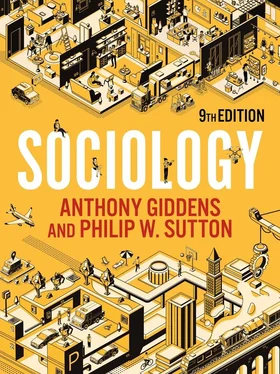First, postcolonial scholars argue that sociology has generally not taken enough account of the devastating impact of colonialism on countries in the Global South. Not only did this involve exploitation at the time, but the legacy of colonialism continues to blight these countries long after they achieved independence. Second, the lack of Global South perspectives in the formation and development of sociology led to the discipline adopting a fundamentally Eurocentric position that was, and still is, focused primarily on the industrialized countries of the Global North (Connell 2018). Opening up sociology to more studies by scholars in the Global South is one way in which this situation can begin to be addressed. We have included something of the continuing engagement between sociology and postcolonialism at various points throughout this volume.
The book’s chapters also introduce ‘classic studies’ in specific areas of sociology. These are pieces of research, theories or novel methods that have had a large influence on the subject. However, these are our selections, and there are many more that could have been chosen. Classic studies boxes incorporate a brief critical commentary which points readers towards the limitations of these studies. With these necessary qualifications, we now turn to the established West European founders of sociology.

The process of industrialization is discussed in chapter 4, ‘Globalization and Social Change’, and chapter 13, ‘Cities and Urban Life’. Some of the damaging consequences of industrialization are outlined in chapter 5, ‘The Environment’.
No single individual can found a whole field of study, and there were many contributors to early sociological thinking. However, particular prominence is usually given to Auguste Comte (1798–1857), who invented the word ‘sociology’ around 1840. Comte had originally used the term ‘social physics’ to describe the new subject, but some of his intellectual rivals were also using that term. To distinguish his own approach from theirs he coined the term ‘sociology’ – the systematic study of the social world.
Comte’s thinking reflected the turbulent events of his age. He wanted to create a science of society that would discover the ‘laws’ of the social world, just as natural science had discovered laws in the natural world. He recognized that each scientific discipline has its own subject matter, but Comte thought that a similar logic and scientific method would apply to them all. Uncovering the laws that govern human societies could help us to shape our own destiny and improve the welfare of everyone.
Comte wanted sociology to become a ‘positive science’ that would use the same rigorous methods as astronomy, physics and chemistry. Positivism is a doctrine which says that science should be concerned only with observable entities that are known directly to experience. On the basis of careful observation, laws can then be inferred that explain the relationships between those observed phenomena. By understanding the causal relationships between events, scientists can then predict how future events will occur. A positivist approach in sociology aims to produce knowledge about society based on evidence drawn from observation, comparison and experimentation.
Comte argued that human efforts to understand the world have passed through three broad stages: the theological, the metaphysical and the positive. In the theological stage, thinking was guided by religious ideas and a belief that society was an expression of God’s will. In the metaphysical stage, society came to be seen in natural rather than supernatural terms, with events being explained by reference to natural laws. The positive stage, ushered in by the discoveries of Copernicus, Galileo and Newton, encouraged the application of scientific methods. Comte regarded sociology as the last of the sciences to develop, but he argued that it was also the most significant and complex.
In the latter part of his career, Comte was keenly aware of the state of the society in which he lived and was concerned with the inequalities produced by industrialization and the threat they posed to social cohesion. The long-term solution, in his view, was the production of moral consensus through a new ‘religion of humanity’ to hold society together despite the new patterns of inequality. Although Comte’s vision was never realized, his contribution in founding a science of society was important to the later professionalization of sociology as a legitimate academic discipline.
Another French sociologist, Emile Durkheim (1858–1917), had a more lasting impact on sociology than Comte. Durkheim saw sociology as a new science that turned traditional philosophical questions into sociological ones demanding real-world – empirical – research studies. He argued that we must study social life with the same objectivity as scientists study the natural world, summed up in his famous injunction to ‘study social facts as things’. By this he meant that social institutions have a hard, objective reality that enables them to be analysed as rigorously as objects in the natural world.
But what is a social fact? Durkheim explains that social facts are all those institutions and rules of action which constrain or channel human behaviour. For the individual, social facts can feel rather like an external pressure, though most of the time they are simply taken for granted as ‘natural’ or ‘normal’ parts of life. For instance, the monetary system is a social fact we rarely think about. We are paid in money, we borrow money from banks to buy a car or a house, and if we have not been good at managing money we will be considered a high risk and may not be allowed to borrow. But the monetary system was already in place before we were born and, as we are forced to use it if we want to take part in our society, we are subject to its rules. In that sense, the system constrains or shapes our actions. This is typical of all social facts; they exist independently of the individual and shape their choices and actions.
In his analysis of suicide rates, Durkheim used the concept of social facts to explain why some countries have higher suicide rates than others (see the ‘Classic study’ below). Suicide seems to be a purely individual act, the outcome of extreme unhappiness or perhaps deep depression. Yet Durkheim showed that social facts such as religion, marriage, divorce and social class all exert an influence on suicide rates. And, as there are regular patterns across different countries, these patterns must be explained in a sociological not a psychological way.
Durkheim was preoccupied with the changes transforming society in his own lifetime and was particularly interested in social and moral solidarity – what it is that binds society together. Solidarity is maintained when individuals are integrated into social groups and regulated by a set of shared values and customs. In The Division of Labour in Society , Durkheim (1984 [1893]) argued that the advent of the industrial age also led to a new type of solidarity.
According to Durkheim, older cultures with a low division of labour (specialized roles such as work occupations) are characterized by mechanical solidarity. Most people are involved in similar occupations and bound together by common experiences and shared beliefs. But the development of modern industry and the enlargement of cities produced an expanding division of labour which broke down mechanical forms of solidarity. With the increasing specialization of tasks and roles, a new type of organic solidarity was created. As the division of labour expands, people become increasingly dependent upon one another, because each person needs goods and services that those in other occupations supply. Like the human ‘organic’ body, each part or organ depends on all the others if the whole society or body is to function properly.
Читать дальше













